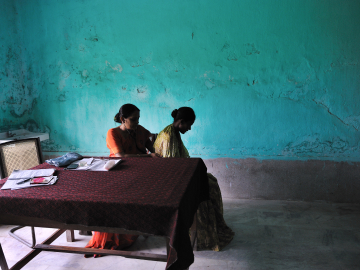#CUGH2018 Warm-Up with Keith Martin
The 9th annual Consortium of Universities for Global Health conference is underway in New York, ready to inspire the global health academic community to take knowledge on paper and breathe life into it to tackle neglected challenges. Keith Martin, MD, PC, CUGH’s executive director shared some insider tips with GHN’s Dayna Kerecman Myers on what to look for at the conference.
For those of you who can’t be here, GHN will bring you news and insights from the conference on GHN’s #CUGH2018 blog and on social @ghh_news.
What are some of the neglected challenges in global health?
The weakness in public institutions, which leads to poor governance and corruption, is a key neglected challenge. Another is the gap in funding and attention to noncommunciable diseases versus infectious diseases. NCDs cause 70% of all deaths globally, yet receive a fraction of the funding that infectious diseases receive. And that has to change. The overall lack of support for public health underpins the inability to deal with the tsunami of NCDs hitting every county—but particularly those in low-income settings.
More neglected challenges include the dramatic neglect of environmental degradation and climate change, which are existential threats, and difficulties engaging both the public and the political. That includes academia’s weakness in being able to engage both the public and politics. I’d also include rising inequality, and the lack of equity that you find in partnerships involving low-income countries.
What can we look for at CUGH this year to address some of these challenges?
The whole conference addresses health disparities. It’s is a chance for people to be informed, to network—and of course mobilize to act. We really want people to leave with new knowledge, new collaborations and networks that they can use when they go home, to implement and scale up the knowledge to improve the wellbeing of people and environments. If we don’t implement what we know then it’s just knowledge on paper—it doesn’t help anybody. We’ve got to breathe life into that knowledge, and we hope our conference will help—on issues including everything from ONE health to global cancer, surgery, and climate change.
What’s the biggest obstacle to global health today?
I’d say the lack of public and political knowledge of the issues, combined with the mistrust of science by both the public and politicians that leads to a decrease in support for scientific information. It leads to decreased funding and decreased awareness of how to address challenges and close the gap between the knowledge we produce and solutions.
What are the big opportunities for global health, and how can they be achieved?
Those in global health need to be more active, and do a better job of engaging both the public and politicians. There is a severe communication gap, and we need to be better equipped and willing to engage both with politicians and, importantly, the public—because the public moves the political.
We also have to increase our engagement and knowledge about what’s happening with the environment. We’re at a tipping point; if we don’t address the environmental threat, our health indices will suffer dramatically and we will not achieve the Sustainable Development Goals.
How are proposed cuts to US global health funding affecting the field?
So far Congress has blocked the Trump Administration’s attempts to cut NIH funding, thankfully—but the CDC, EPA, USAID are all sustaining deep cuts that threaten the health, welfare and security and stability of people in the US and around the world. This is a terrible threat to the US, and it’s a major threat to people here and around the world. Academia, NGOs and the private sector need to support our colleagues in the public sector—those extraordinary public servants who work across the US government—to improve the lives of people around the world. They can’t defend themselves. So we need to speak up. We have to connect what we want politicians to do with political outcomes; that’s up to all of us across sectors to mobilize the public to support global health.
What inspired the choice of Health Disparities: Time for Action as the theme of this year’s annual conference?
Inequality undermines the political and economic stability of every country. It’s going up around the world, and rising inequality causes institutional obstacles to individual advancement. We want our conference to mobilize the global health community to address this neglected global health challenge.
What will be the biggest news to come out of the conference?
I think you’ll see a big announcement on cervical cancer; they’ll also be a lot of great outcomes in terms of CUGH’s collaboration with the African Forum for Research Education and Health and our joint effort to increase and strengthen training capabilities in African institutions. Also look for news on the reasons global health is a smart investment for the health and welfare of people—through both CDC and USAID. Solutions for addressing climate change and the built environment will also be prominent. For students, we’ll also have special sessions focused on their needs, including the affordability of education and student debt.
Attending conferences like this can be an expensive challenge for organizations. What’s your message to people deciding whether to attend or not?
We try to keep our costs low; they’re about 30-40% lower than other equivalent conferences, and we have a sliding scale. With our current prices, we subsidize all students and LMIC attendees—what we’re charging people is actually less than our costs for all students and LMIC attendees. We do understand how cash-strapped people can be, but we’ll hope they’ll see that this is really a go-to event in the global health calendar that packs a lot of value.
We also raise funds every year for travel scholarships for LMIC presenters, and we hope we can increase the number of people who donate to that effort.
Any chance for an overseas venue for the conference in the future?
We’d have a hard time legally and financially to run this meeting overseas, but we try to collaborate with our existing members overseas—working with them on their programs, and helping them identify good speakers and develop content.
Our 2019 conference March 7-10 will be in Chicago, on translation and implementation for impact in global health. We’re very excited about working with our Midwest members; we hope to change the impression that global health in the US is largely bicoastal. We’re also working hard to engage minority-serving institutions largely left out of global health—with an effort underway to reduce their CUGH membership rates by 50%.
What are your personal priorities for this year’s conference?
We’re hoping for a full house and for attendees go away with new knowledge, new networks and action plans, and that they take that knowledge back home, to implement the solutions we know can address global heath challenges.
And, I hope everyone will have a great time and want to come out to Chicago in 2019.
This interview has been edited for clarity and length.
Join the tens of thousands of subscribers in more than 100 countries who rely on Global Health NOW summaries and exclusive articles for the latest public health news. Sign up for our free weekday enewsletter, and please share the link with friends and colleagues: http://www.globalhealthnow.org/subscribe.html




